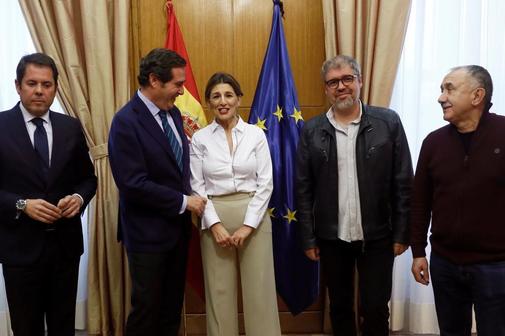A day later, the first labor agreement of the legislature, the rise of the Minimum Interprofessional Salary (SMI) to 950 euros, had the Vice President of the Government, Pablo Iglesias, as the great muñidor of the pact . "Garamendi" - with whom he acknowledged having a special feeling - has worked wonderfully, "admitted the leader of Podemos.
Unai Sordo and Pepe Álvarez also, from CCOO and UGT, celebrated the rise in the social negotiation table that they had long claimed as part of their list of claims due since the crisis came out in 2015. Generously, Álvarez pointed out Yolanda Díaz, Minister of Labor, as the person on whom the pact pivoted. None of them named Iglesias.
Only in the business part Gerardo Cuervas and Antonio Garamendi warned of the efforts of companies in certain sectors to absorb the rise of 2019 and the difficulties they will have in 2020. Of course, after the pact, there is a certain feeling among businessmen and unions that Garamendi set the best deal.
"He managed to reduce by half the rise proposed by Podemos, rejected the multi-year commitment proposed by the Government and unions and, far from opposing a decree that could have passed over him, has made it clear that he is open to negotiate everything and wants to be called, "explain these sources.
In this sense, the SMI signed by CEOE and Cepyme is a good starting point for a negotiating agenda that will begin in the next few days with Pedro Sánchez's call to social agents. The program is to initiate the repeal of the most damaging aspects of the labor reform, as the president of the Government says, or the entire 2012 labor reform, as the Minister of Labor says.
For entrepreneurs, the game starts now. Díaz announced that the whole process of "dismantling" of the labor framework will be quick and in two phases. The first includes a series of points that have been on the table of social agents for months, such as restoring the ultraactivity of the agreements or the prevalence of sectoral agreements on business . The second is the repeal of the labor reform regarding layoffs and hiring, for example.
With this horizon, Garamendi repeats as a mantra that what he offers and expects from others throughout the process is "institutional loyalty," that is, nothing of unilateral derogations without going through the negotiating table.
In business fields they admit that, in the part of the Government, they have a "moderate" and a very "ideological and academic" part in front. A part, according to other sources, that now lands in reality with a reduction of its electoral promises in the SMI and that will be subject to timely monthly examinations of unemployment and quarterly data from the Active Population Survey (EPA) , which It is published next week.
In the opinion of labor experts, the latter statistic will confirm that during the first full year with the PSOE at the controls, either in full faculties or in functions, the deceleration of the labor market has intensified with a decrease of about 100,000 jobs with respect to the data of 2018.
"They are seeing it already: with each announcement of radical reforms they increase the insecurity of the entrepreneurs in the face of hiring," say the same sources, who rate the reduction of the SMI from 1,000 to 950 euros as a "damage control" by of CEOE . Garamendi, according to these sources, has asked the Government to strive to measure the entry into force in sectors such as agriculture and livestock.
This reality together with the foreseeable reaction of the debt markets to unilateral reforms of the labor framework and the pressure of Nadia Calviño in the Council of Ministers suggest among the social agents that the plans announced by Díaz are also lowered. "It has already happened with the predecessor, Magdalena Valerio. What a ministry proposes is always reviewed by the others affected," explains a former member of the Government.
The speed of the reforms will now depend on unions and businessmen, each connoisseur of the red lines of the opposite. Both parties indicated from before the last elections that the negotiation for the rise of the SMI that will be decreed by the Government was the smallest of their differences. "If they leave us, we agree very quickly," they said. Both parties knew that the 1,000 euros promised by Podemos were not going to be agreed. Although they were very clear that the SMI is the exclusive competence of the Government and that there was the possibility of a decree , the rise fork was set from the beginning between 970 and 945 euros.
In fact, even before the call for an election date they announced that, unlike the political parties, they would keep their work agenda until a government interlocutor appeared in full power. The result of this understanding was, for example, that the unions supported CEOE and Cepyme in front of the Government to allow contractor entrepreneurs with the Administration to update the prices of their services with the decreed increases.
According to the criteria of The Trust Project
Know more- We can
- Yolanda Diaz
- CCOO
- Pablo Iglesias
- UGT
- minimum salary
- CEOE
- Pedro Sanchez
- PSOE
- Nadia Calviño
- Magdalena Valerio
LaborThe SMI of 1,000 euros, the first crack in the new tandem Díaz-Escrivá
LaborThe Government cuts by half, to 950 euros, the rise of the SMI promised by Podemos for 2020
Government Pedro Sánchez trusts pensions to a 'hawk' of spending control

